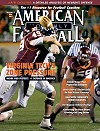AMERICAN FOOTBALL MONTHLY THE #1 RESOURCE FOR FOOTBALL COACHES
Article CategoriesAFM Magazine
|
Situational Success - An Offensive Checklistby: Phil PriceOffensive Coordinator, Maranatha Baptist Bible College © More from this issue The content of this article will serve as a reminder as you prepare your offense each week. This article is based on some lessons I'm continuing to learn as a play caller. When preparing team offensive practice, coaches need make decisions as to the nature of these sessions. How much time is given to live scrimmaging? Can our objectives be accomplished with "dummy scrimmage" or plays on air? What kind of defense will we be facing this week? I would encourage you to go beyond those questions, however, and consider the following situations. 1. Run plays from the hash marks. Some benefits include: * Your squad gets used to executing plays both to the wide and to the short side of the field. * You can make sure that your players are aligning properly in your formations. * You can get a further feel for what your team's strengths are. You may find that you have an advantage running plays to the wide or short side. For example, on a high school team that I coached a few years ago, several factors led us to discover that one of our strengths was running toss sweep to the short side of the field. 2. Use down-and-distance. On purpose, put yourself in the position to have to make the "tough calls" during the week: * What will you run on 3rd and 4? How about 4th and 2? What about 3rd and goal from the eight yard line? As an example, several years ago, we really liked throwing the fade down on the goal line. We had a quarterback that threw it well and a couple of tall receivers that ran it well. We would drill this situation during the week. * What plays will you run should you end up with the ball at your own 1 yard line? Will you change any of your alignments? * Limit the amount of time that you have to call plays. Have someone spot the ball and start a "play clock". Practice making decisions and communicating in game-like time constraints. If you shuttle plays in with players on game day, do it during practice as well. 3. Prepare for clock-management: * Two-minute drill. How will you communicate from the sideline if you want to call time-out, have the team huddle up, spike the ball, or call a play on the line? Do you want to run a play to the middle of the field to set up a field goal attempt? * Milking the clock. If you are ahead in the fourth quarter - have your players take their time getting up, use the full 25 seconds to snap the ball (designate a coach to signal if there is no 25 second clock), stay inbounds, and protect the football. If you have to punt, remind your punt team that if the opponent's return man does not catch the ball, just have your coverage personnel surround the ball, but do not down it. Let as much time run off the clock as possible and make the official blow his whistle to end the play. * Victory formation (for the "kneel-down"). Tell your squad how you want them to align, designating a sure tackler in a two-point stance about 10 yards behind the quarterback. 4. Get ready for overtime. Communicate your philosophy about the following: * Running offense when you get the ball first and the score is tied. * Running offense when you get the ball second and the other team has scored. * Running offense when you get the ball second and the other team failed to score (field goal possibility on third down if you have a strong kicking game). While you may not be able to prepare my team for every situation that may arise in a game, you can get them ready for most. Practicing these situations during the week will give confidence when you face them on game day. Coach Phil Price has been the offensive coordinator at Maranatha Baptist Bible College in Watertown, WI since 2002. He is also head baseball coach at Maranatha and a teacher in the Applied Science Department. Price graduated from Maranatha in 1995 with a Bachelor of Science degree in Mathematics Education. He also has a M.A.T. degree in Teaching Mathematics from the University of Idaho. He can be reached at pprice@mbbc.edu. |
|
| HOME |
MAGAZINE |
SUBSCRIBE | ONLINE COLUMNISTS | COACHING VIDEOS |
Copyright 2024, AmericanFootballMonthly.com
All Rights Reserved




